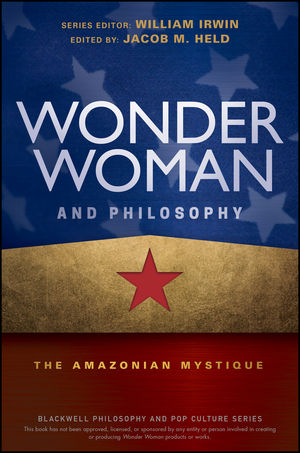Wonder Woman, Schopenhauer, and Compassion
It’s not about What They Deserve
Jacob M. Held
“It’s not about what they deserve. It’s about what you believe.” Exactly! It is difficult to be a “yes-sayer” in a world of war, refugees, famine, murder, and so much human, all too human ugliness. But amidst all the pain and horror there is one response that is fitting, compassion. Or as Diana claims “Only love can save the world.”
On Themyscira, or Paradise Island, Diana is inoculated from pain and suffering. She lives in a fantasy world, where her only real problem is that her mommy doesn’t want her training with her aunt. She’s the only kid in paradise, and the child of the queen. She’s doing pretty well. That is, until humans, namely, Steve Trevor with Germans on his trail, arrive. And if you ever want to know where it always goes wrong, just look for the humans. They’ll be at the center. And so Diana is drawn into the world of man.
Steve tells Diana and the Amazons about what’s been going on in the world of humans while they’ve been hidden away in paradise. He relates the horrors of WWI especially Dr. Poison and her potential to kill millions and prolong the war indefinitely. Diana recalls her history lessons. She sees this clearly as the work of Ares, and like a naïve idealist – what else could she be – decides to go to the front with Steve. Once there, she’ll kill Ares and end the war. And with Ares is dead, humans will be good once more.
Diana is right. Ares is at the heart of it. But as the god notes, he doesn’t make humans fight. He doesn’t “make” them do anything. He just provides the opportunity for their darker natures to come out. At root humans are bad. They are rotten, cowardly, selfish little egoists. This is what Ares wants Diana to see. He wants her to see this and to hate humans for it. He is a misanthrope.
Ares is a classic example of what Schopenhauer noted: “To many a man, particularly in moments of melancholy and depression, the world may appear to be from the aesthetic standpoint a cabinet of caricatures, from the intellectual, a madhouse, and from the moral, a den of sharks and swindlers. If such a dejected mood becomes permanent, misanthropy is the result” (On the Basis of Morality, pp. 134-5). From a myopic point of view, one that only focuses on the evil that people do, one could appreciate this perspective. But Diana is different. She looks at humans and sees the potential for good, even though it is rarely exhibited. But more importantly, for Diana, it’s not about proof that humans deserve better, that they deserve her. It’s not about what they deserve, but what you believe.
Here we see Wonder Woman relying on faith. Believing in the goodness of people, even if exhibited rarely with the preponderance of evidence pointing to the contrary. Call it cognitive dissonance, affective faith, or naiveté. But what she is doing is believing in the goodness of people until they act like it. She is refusing to fall into cynicism, nihilism, or misanthropy. She will not be driven by resentment or anger or hate. Instead, she is motivated by love, by compassion. So we see the Schopenhauerian lesson in Wonder Woman.
Begin with pessimism. Life is defined by pain and suffering; this is the nature of human existence and to hope for better is to delude oneself. Schopenhauer claims: “life swings like a pendulum to and from between pain and boredom, and these two are in fact its ultimate constituents” (The World as Will and Representation Vol. I, p. 312). We struggle and fail, or we struggle and achieve something, only to be quickly disappointed. Schopenhauer focuses on the negative, gives it predominant weight, and develops a philosophy based on this “truth.” Now I’m sure Seneca, Marcus Aurelius, or Epictetus could’ve helped him reframe things and perhaps develop a more life affirmative philosophy. But he sees life as defined by infinite struggle and perpetual disappointment. So we’re doomed as humans.
Diana can’t relate. She lives in Candyland, where everything always comes up roses. Themyscira is paradise, it is utopia. But Man’s World, the world of WWI, quickly shifts her perspective. She’ll have to face pessimism head on and then decide how to respond.
Wonder Woman experiences the world in all of its misery. She sees a village wiped out, women and children slaughtered, men maimed and brutalized, and she laments her choice to come to Man’s World. She sees what men are, what people are, and that they won’t change. She knows this. This is what the preponderance of the evidence proves. She remembers her mother’s words, “They don’t deserve you.” And at a point, she agrees. The world doesn’t deserve her, her purity, her goodness, her virtue and sacrifice.
The world of men is a world of self-inflicted misery, driven by egoism and malice. But as Schopenhauer says, “The world is sunk in evil, and men are not what they ought to be; do not let that lead you astray, and see that you are better” (On the Basis of Morality, 129). Steve Trevor exemplifies this for Diana. He says he made a choice. He could choose to do nothing or do something. Ultimately, he chose to do something. As imperfect as he is, as small as his efforts are in the grand scheme of things, he acts. What else could he do? And Diana draws on this. She left Themyscira because she wouldn’t be able to live with herself if she didn’t go, if she did nothing. Steve Trevor sees that he is better, and Diana sees through him that this is the proper response to pessimism, to the wretchedness of the human condition, not withdrawal or depression but action, and ultimately love.
Schopenhauer builds his moral philosophy on a simple formula: “Injure no one; on the contrary, help everyone as much as you can” (On the Basis of Morality, fn. 92). He recognizes that the world is sunk in evil, and so we have at least an obligation or natural duty to not make it worse. Beyond this, however, we can be better and do better. Even if you recognize that the world is fundamentally suffering, that pain is endemic to the human condition and that you’ll never eliminate it, you can still help where you can while you can. And really, what other respectable option do we have? We either do something or nothing.
Schopenhauer notes that all evil stems from egoism. “Egoism is…the first and principal, although not the only force with which the moral incentive has to contend” (On the Basis of Morality, p. 134). He adds, self-interest destroys the moral worth of an action, and it is the other’s benefit without any reference to one’s own good, that gives an action its real moral worth” (On the Basis of Morality, p. 139).
In excluding egoistic actions from actions of moral worth, Schopenhauer seems to be assuming a great deal, namely, that self-interest is not a moral interest, but perhaps merely a fact, like the self-preservation of an animal. An animal saving its own life is not a moral act, but a simple instinct. So egoism in humans, although of a higher degree than that of animals, stems from the same source, self-preservation, and thus can’t be a moral position. It is just a fact of our animal nature. So it appears that an orientation to the other, an ability to see the other as oneself, is the beginning of an ethical disposition.
Schopenhauer sees empathy as our proper disposition. We need to love the other as ourselves. He praises Christianity for getting this right. But empathy as a feeling is a mystery. Compassion, however, is a virtue. Schopenhauer is a virtue theorist. He maintains that certain dispositions exemplify human excellence and ought to be fostered. He begins with a simple formula as noted above: Injure no one, in fact, help as much as is possible. This formula asks two things, to both do no harm and to help as much as possible. The first demand, to do no harm is met with the virtue of justice. Justice demands people be treated equally, with equal concern and so we are to harm no one, no one person’s good should come at the expense of another.
But more interesting for our present discussion is the demand that we ought to help as much as is possible. This is Schopenhauer’s virtue of philanthropy. Philanthropy, for Schopenhauer, is the virtue of loving-kindness; a disposition in us to take the other’s weal or woe as the motive for our action, and this virtue is manifest in acts of compassion. We must train ourselves to be compassionate. This means acting against our egoistical tendencies. It means acting in faith for the good of our fellow suffers, and thus becoming the kind of person we ought to be, namely compassionate and caring.
So it’s not about what we know. It’s about what we believe, and about how we act on this belief, how we live this basic act of faith. As Diana says, “Only love can save the world.” Love is a gift, an act of faith about how we decide to orient ourselves towards the other, not about what they deserve, or about what we think we know about their deep character. Everyone fights their own battles, but we can stand beside them as they fight, as Diana stands beside her comrades in arms.
Wonder Woman has always been a diplomat, a healer, and a teacher. And we can learn a lot from Diana, especially by watching her as she learns her own lesson. She goes from naïve, idealistic citizen of Themyscira to fatalistic pessimist, to compassionate, loving Goddess all in the span of two hours and fifteen minutes. Maybe we can find something there to inspire us toward our better selves. A command to be better. When we see that people are not what they should be, and when we are being led astray by egoism, resentment, hatred, or anger let Diana lead us back onto the path of love and compassion, so that we might see that we are better.
Jacob Held is an Associate Professor of Philosophy and Director of the UCA Core at the University of Central Arkansas in Conway, Arkansas. He is the editor of Wonder Woman and Philosophy: The Amazonian Mystique (Wiley 2017). He publishes primarily at the intersection of philosophy and popular culture. His recent work includes: Stephen King and Philosophy (Rowman and Little field 2016), and Roald Dahl and Philosophy: A Little Nonsense Now and Then (Rowman and Littlefield, 2014).
References
Arthur Schopenhauer, On the Basis of Morality, Translated by E. F. J. Payne (Oxford: Berghahn Books, 1995).
Arthur Schopenhauer, The World as Will and Representation Vol. I, Translated by E. F. J. Payne (New York: Dover Publications, Inc., 1969).




